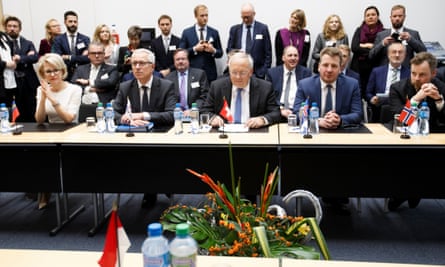Unless the UK is willing to submit to the rules and regulations from the European Union, the Norway option is not really on the table. Norway’s relationship with the UK has warmed considerably since our king Harald Hardrada failed to invade England in 1066 and lost the battle of Stamford Bridge. But our status with the EU is complicated.
Norway was one of the founding members of the European Free Trade Association (Efta) together with the UK in 1960. Efta was established more or less to serve as an alternative trade bloc for those European states unable or unwilling to join the then European Economic Community (EEC), later to become the European Union. Both the UK and Norway applied to join the EEC twice in the years that followed, but the French president, Charles de Gaulle, doubted the political will of the UK to join the community, thus blocking not only the UK, but all applicant countries. We could of course blame the UK; but like you, we’d rather blame the French.
When the UK finally joined the common market in 1973, the Norwegian people had already rejected it in a referendum the year before. This was before the Single European Act of 1986 clarified how the common market could advance to create a frictionless, unified market incorporating the “four freedoms”: movement of goods, services, people and money. By the time this framework was finalised, most Efta countries had become full members of the EU. They saw the benefits of being a part of the decision-making process on the inside, rather than just having to accept the rules and regulations to access the market from the outside.
We chose to integrate as deeply in to the single market as possible through the European Economic Area agreement, the Norway option. It allows us frictionless access to the single market because we comply to the EU’s rules and regulations, but leaves us outside the decision-making process.
This is the primary reason why the EEA agreement, or the Norway option, really is not an option for the UK. We are fully integrated into the single market by accepting the rules and regulations from Brussels to harmonise our products and services to EU standards. Not only does this provide frictionless access to our most important market, it also saves us the bureaucratic effort of developing new regulations.
This is not without controversy, but for the most part we welcome updated regulations protecting our citizens’ rights and levelling the playing field as regards trade. The UK’s Brexit supporters want to develop their own legislation.

Secondly, compliance with EU legislation for EEA countries is ensured through the body of the Efta surveillance authority and the Efta court. This corresponds to the European court of justice, which ensures the enforcement of the said rules and regulations, enabling right to triumph over might. We believe this protects our citizens’ rights and our companies against unfair competition. Brexiters reject the ECJ.
In addition, we accept the four freedoms, including free movement of workers. This has for the most part boosted the Norwegian economy and provided both skilled and unskilled labour to industries and services in need. Many in the UK want to regulate this migration.
Lastly, Efta is still a trade block. We already have 28 trade agreements with 39 countries outside the EU. It seems incredible that the UK would prefer to enter 28 trade agreements, putting the interest of the 38,000 citizens of Liechtenstein ahead of the 66 million citizens in the United Kingdom.
More importantly to me, I do not believe it is in Norway’s interest to invite the UK into the Efta bloc. It would certainly upset the balance within Efta – and thus our relationship with the EU. Further, the EEA agreement presupposes a consensus between the countries to harmonise with the same EU laws and regulations the UK wants to veto. These are the laws and regulations we rely on to have frictionless access to our most important market. A veto from one country affects the other countries: letting the UK join Efta and the EEC agreement to veto parts of it could undermine the agreement for all of us.
The UK seems to be considering joining our Efta family as a temporary solution – Norway for now – until it gets a better deal. It really surprises me that anyone would think Norwegians would find that appealing. It would be like inviting the rowdy uncle to a Christmas party, spiking the drinks and hoping that things go well. They would not.
Norway will, of course, be looking for a long-term partnership with the UK after the divorce from the EU, but we’re not interested in being the rebound girl while you look for better options.
